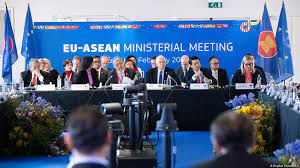EU grilled on Gaza at Indo-Pacific talks

Rosie Birchard – DW
Brussels: The European Union says it wants to deepen ties with the Indo-Pacific, the region stretching from the west coast of Africa to the South Pacific, often seen as a geopolitical battleground between the world’s big powers. As delegations from 70 countries crammed into meeting rooms in Brussels on Friday, the bloc reiterated its thinly veiled pitch to rival China and become the Global South’s partner of choice.
“The European Union has a lot to offer; we are a transparent and reliable partner,” EU top diplomat Josep Borrell said, listing off commitments to work more closely to combat climate change, boost trade, develop technology and invest in infrastructure.
With conflicts in Ukraine and Gaza taking up much of Brussels’ bandwidth, the EU sought to reassure the Asian countries of its interest during the bloc’s annual Indo-Pacific ministerial forum on Friday.
“We are not forgetting the broader picture: the centre of gravity of the world’s economy has shifted to the Indo-Pacific region, with close to 50% of the world’s GDP and 60% of the world’s population,” Borrell wrote in a statement on Wednesday.
But besides the smiles and group photos, differences over the Israel-Hamas war soon bubbled to the surface.
Speaking to DW and other outlets on the sidelines of the talks, Sri Lankan Foreign Minister Ali Sabry spoke out against what he called a “double standard when it comes to the Middle East and the plight of the Ukrainians.”
“The credibility of the Western world is at stake unless you treat all of them equally,” he said.
Indonesian Foreign Minister Retno Marsudi also called for EU ministers to put more pressure on Israel to rein in its military operations in Gaza, launched in retaliation to Hamas terror attacks on October 7.
“Consistency between values and action reflect the sincerity of our moral ground. It shows who we actually are,” she said in a speech.
Heading into the meeting, Finland’s foreign minister rejected the accusation.
“It’s not a double standard at all. We are steadfast against any targeting of civilians,” Elina Valtonen told reporters. “We have been condemning the Hamas attack very, very directly. But also, we do recognize that while Israel has the right to protect itself and its civilians, it also needs to do that obliging to international law and humanitarian law.”
Austria’s top diplomat, Alexander Schallenberg, also pushed back on the claims. “That’s simply not true — because what did Russia do? It was a neo-imperialistic invasion of another country where you deny the very right of the existence of this country and the people.”
He went on to describe the October 7 attacks as a “massacre.”
The EU has struggled to speak with one voice on the conflict in Gaza, and on Friday, Borrell acknowledged differences.
“We have to pay a lot of attention because our position on the conflict in Gaza could certainly jeopardize our relationship with many people around the world,” he said. “And we have to explain the different positions inside the European Union. This is a very dividing question.”
The EU, like Germany, the United States and several other countries, regards Hamas as a terrorist organization.
In a statement published Friday after a second round of talks between European ministers and their counterparts from Southeast Asian regional bloc ASEAN, all sides agreed to disagree on the Middle East.
“We agreed to condemn all attacks against civilians & we noted the call of some of us for a durable ceasefire,” the shared statement said. “We called for the immediate and unconditional release of all hostages, especially women, children, the sick and the elderly. In this context, some of us raised the importance of release from arbitrary detention.”
EU and ASEAN nations used a similar, non-committal formulation to paper over cracks in unity on Russian attacks on Ukraine. “Most members strongly condemned the war in Ukraine … There were other views and different assessments of the situation and sanctions,” they said in the jointly drafted text.
While Brussels has slapped a slew of sanctions on Moscow for its full-scale invasion of Ukraine, some Asian powers, including India, Pakistan and Vietnam — all of which were represented at Friday’s talks — have been less keen to publicly condemn Russia.
“It is natural that countries that are separated geographically and have different perspectives and different issues will not have a complete overlap in the way they think about various issues. But the point is, I think, there needs to be a dialogue,” Kumaran Periasamy, an official representing India at Friday’s talks, told journalists.
Twenty EU foreign ministers took part in the forum alongside dozens of Asian and African ministers and officials, but top German diplomat Annalena Baerbock could not attend due to scheduling issues. Berlin instead sent a more junior state minister, with fellow EU heavyweight France also sending a less senior envoy. Borrell denied this no-show signaled less appetite for engagement with the Indo-Pacific when asked by DW.
“Does it mean the European Union is presenting less interest this year than last year because Germany and France is not being represented at the level of the minister? Certainly not,” he said.
“Life is life, people have agendas,” he said. “Not everybody can be everywhere at the same time.”





